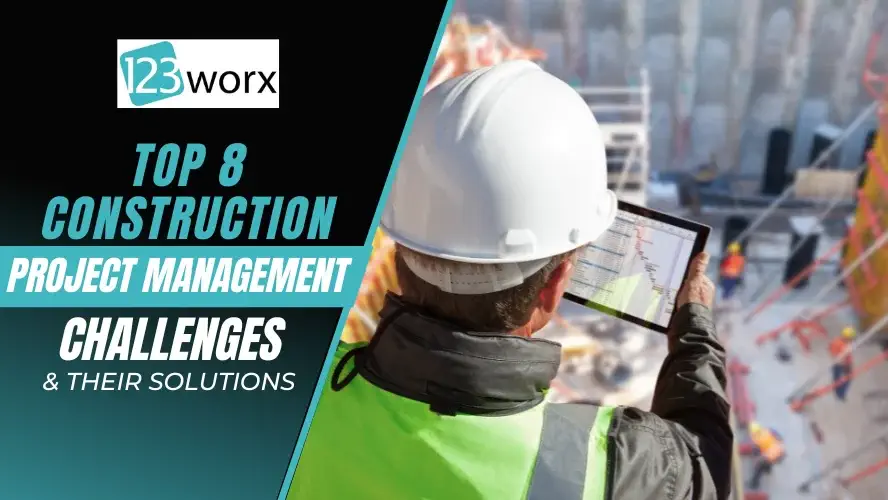Each construction project has unique challenges and managing it is not so easy task as it is prone to more risks and complexities. From prior planning to effective coordination to seamless execution are involved in managing a construction project.
However, there are several challenges faced by construction companies and project managers that can cause confusion and even delay the most well-planned projects.
In this blog we are covering the most common construction project management challenges and the best solution for them.
Importance of Effective Construction Project Management
Before moving on to a detailed analysis of specific challenges, it is required to understand the importance of effective project management in the construction business.
In fact, construction projects are highly complex affairs that involve stakeholders, tight timelines, and huge investments. Without proper management, these projects might easily lead to time delays, cost overruns, and quality degradation.
Project management is aimed to ensure that the goal of the project is accomplished within the stipulated timeframe at a reasonable budget and to the satisfaction of the stakeholder.
The process of project management requires detailed planning, effective resource management, early recognition of risks, and ongoing monitoring for successful outcomes. Completing projects in the construction sector, successfully, can be managed in an understandable way by project managers.
Top 8 Construction Project Management Challenges & Solutions
Let’s explore the common construction project management challenges in 2024 and how project managers can overcome them.
1. Lack of Communication and Collaboration
A construction project involves various parties and stakeholders working together parallelly for successful outcomes. Therefore, communication and collaboration are keys to any successful project.
Poor or ineffective communication is one of the common challenges in construction project management faced by all stakeholders resulting in communication gaps. Unfortunately, such communication gaps arise between on-site workers, off-site workers and back office managers that can result in misunderstandings, time lag, increased expenses as well as delays or even failure of the whole project.
The solution:
To overcome the situation, the project managers have to make sure that well-built communication strategies are formulated that inform the team members about the progress and any obstacles throughout the project. Project meetings on a frequent basis, effective documentation of the project requirements, and even the use of collaborative project management software enable smooth communication for clarity among the involved stakeholders.
2. Budget and Cost Management Issues
Going over budget is another challenge in the construction industry. Most construction projects involve huge investments and, therefore, any inaccuracies or miscalculations can lead to financial losses.
Influencing factors such as the fluctuation of material prices, variations in labor costs, and unforeseen expenses can further complicate budget management.
The solution:
To address this challenge, the project managers should develop a comprehensive budget plan that will allow you to know the estimate of the project accurately.
Regular monitoring of expenditures to stay on track, early noticing of cost-saving opportunities, and effective project management can help in achieving the goal within the budget.
3. Time Management and Scheduling Difficulties
Time management is equally important in construction project management by many stakeholders. Timely completion of project-related activities is essential, as delays can adversely affect the overall project activities and lead to missed project deadlines with penalties.
Certain factors contributing to problems in completing projects on time include weather conditions, labor scarcity, and unforeseen site conditions.
The solution:
To meet this challenge, project managers should come up with a detailed project schedule and tracking methods that clearly lay out a critical path entailing the associated deadlines that allow you to keep the project on track.
Rigorous follow-up in progression responses, potential delays, and deployment of resources is vital to keep the projects on course and minimize disruptions.
4. Managing Project Scope and Scope Creep
Most of the construction personnel managers feel that project scope is their main challenge which can arise due to lack of defined goals. This often manifest as scope creep, a gradual increase of the project scope apart from the initial requirements, leading to increased costs, timeline delays, and compromised quality. These difficulties arise from a variety of factors, including shifts in customer preferences, organizational changes, and poor definition of scope.
The solution:
To address this challenge effectively, project managers can implement a very strong change in the management process. This includes defining the project scope at the start, documentation of any changes that the client requires, and carrying out an impact assessment of these changes on the project.
Effective communication and agreement on scope changes with all stakeholders present is very essential to know how to control and avoid scope creep.
5. Risk Management and Mitigation Strategies
The construction industry involves higher risks and far more expensive costs in comparison to other industries. The factors include design flaws, natural adversities, and site-related conditions that can trigger the risk. Unfortunately, these risks are inadequately identified, assessed, and managed, resulting in costly disruptions and failure of the projects.
The solution:
To address the challenge, the project managers should conduct a thorough risk assessment to identify potential hazards from the start and come out with a full-fledged risk management plan.
This plan is outlined to minimize the identified risks, assign responsibilities, and establish contingency plans. Proactive implementation of mitigation measures through regular monitoring of the risks will help to minimize the disruptions of the projects.
6. Resource Allocation and Management Challenges
Assigning the right resources to the right task continues to be another major challenge in project management. However, achieving this effectiveness can be hindered by various obstacles such as labor shortage, lack of equipment, isolated material storage, and clashing resource requirements. Insufficient resource allocation results in delays, increased costs, and compromised quality.
The solution:
To navigate the challenge, the Project Manager must have a comprehensive understanding of the requirements and the available resources.
With effective planning, close follow-up of resource utilization, and proactive coordination with subcontractors and suppliers can ensure that the projects have the necessary resources at the right time.
7. Quality Control and Assurance Challenges
Quality in construction ranks number one in the list of value created by each of the companies in the industry. However, ensuring quality throughout the project lifecycle can be challenging. The quality program should encompass regular monitoring to identify early and rectify the issues.
The solution:
To address this challenge, project managers should come up with a robust quality control program that includes inspections, regular tests, adhering to industry standards and regulations. The teams for quality assurance should work in collaborations, monitor metrics regarding the quality, and work on resolving the issues pertaining to the quality of the project.
8. Technology and Software Solutions for Construction Project Management
Today, in this digital age, software solutions and technologies are making a significant contribution to construction project management.
All such project management software tools, Building Information Modeling (BIM) technology, and mobile applications can assist in the communication process, enhance collaboration, and maximize productivity. However, the choice of whether to integrate these technologies into a project is based on its specific requirements.
The solution:
Technology solutions do more routine work, ease real-time communication, and even give meaningful insights through data analytics. Embracing the concept of technology as a best construction management software in practice will make project managers confront several challenges of construction project management.
Best Practices for Overcoming Construction Project Management Challenges
Although the details of the construction project process are unique for each project, some strategies have been found to help project managers address obstacles.
These include:
- Clearly defining project objectives and scope of the outset
- Establishing effective communication channels and fostering collaboration among stakeholders
- Conducting thorough risk assessments and developing comprehensive risk management plans
- Regularly monitoring project progress and making informed decisions based on data.
- Encouraging continuous learning and professional development among project team members.
There is no doubt that the project managers can successfully deliver construction projects by following best practices, proper technologies and proactive strategies.
The construction project management process incorporates different challenges in its achievement. From communication and collaboration problems to budget management and quality control challenges, a project manager has to clear these roadblocks for a project success.
So, whether you’re an experienced project manager or an aspiring one, make sure that these insights are an eye-opener. In addition to this, try project management solution by 123worx that manage construction-related challenges effectively.
How To Avoid Construction Management Challenges Collectively?
This is where the need of a good construction management software comes it. To collectively avoid construction management challenges, try a robust construction project management software with all required features.
Such tools can streamline communication, enhance collaboration, track progress, manage resources efficiently, and mitigate risks effectively. By using a software your teams can stay organized, make informed decisions, and ensure smoother project execution, thereby minimizing potential hurdles and optimizing overall project performance.

As a Vice President at 123worx, Construction Management Platform, Bharat Rudra has worked with hundreds of business executives searching for best-suited software for their construction business with a wide array of requirements. Bharat takes pride in helping construction businesses solve their business and project management challenges. Feel free to reach Bharat if you have any questions. You can find him on LinkedIn or reach him at brudra@123worx.com


Recent Comments